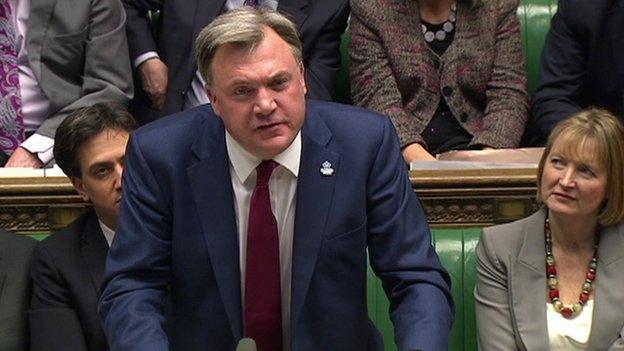Ed Miliband: We'll tackle deficit with 'sensible' cuts
- Published
- comments
Ed Miliband says the UK needs a "long term plan to make the country work for working people"
Ed Miliband has ruled out any uncosted spending commitments in Labour's election manifesto, as he set out his party's plans to reduce the deficit.
Dealing with the public finances will be an "essential test" of Labour's credibility, the party leader said.
He argued boosting wages and taxing the better off, in addition to budget cuts in most areas, could contribute to eliminating the deficit by 2020.
Chancellor George Osborne said Labour only offered "economic chaos".
During a visit to Newcastle University he said Mr Miliband and his party "created the deficit and by delaying paying off the deficit what he's really telling the British people is that he would borrow more money and put up taxes".
Conservative Party chairman, Grant Shapps: "We haven't eliminated the deficit but we have cut it in half"
In his speech in central London, Mr Miliband said Labour would cut the deficit every year of the next parliament.
He promised "sensible reductions in public spending" and outlined pledges Labour has made so far:
Stopping the winter fuel allowance for "the wealthiest pensioners"
Capping child benefit rises at 1%
Scrapping police commissioners
Selling off "unwanted government assets".
He also said Labour would make savings of £500m in local government.
This includes merging some of England's 46 fire authorities and scrapping the New Homes Bonus, which rewards councils for the amount of homes built in their area.
Asked afterwards what more Labour would do to cut spending, he said that beyond the measures announced: "The right way to make these decisions is frankly in government".
He added: "If you start picking things out of the air, they won't be the most sensible changes for the country."
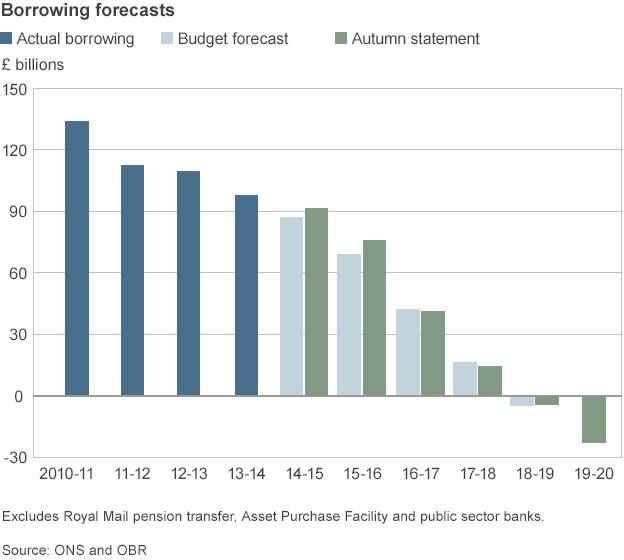
Mr Miliband came under fire from his political opponents and from some within his own party for omitting any mention of the deficit from his keynote conference speech in September - which he delivered by memory without autocue or notes.
In his speech on Thursday, he said: "There is not a path to growth and prosperity for working people which does not tackle the deficit."
Promising a "balanced approach which deals with our debts, but does so sensibly", he called for a "higher wage, higher skill economy".
Labour would also devolve "unprecedented levels" of spending to local government, he added.

Analysis
Robert Peston, BBC economics editor
Labour, as confirmed by Ed Miliband today, is promising that public sector debt as a share of national income will be falling by 2020 and that it will no longer be borrowing to finance "current" spending - that's day-to-day expenses such as civil service salaries and welfare payments, but not investment - also by 2020.
By contrast, the Lib Dems are wedded to the first portion of the path of deficit reduction outlined in last week's Autumn Statement, which would see the deficit on current spending, adjusting for the economic cycle, eliminated by 2017-18. But they are not signed up to as deep spending cuts as those planned by their Conservative partners in government.
As for the Tories, they want to see a surplus on the overall budget, that's including current and investment spending, by 2018-19.

Shadow chancellor Ed Balls has written to colleagues warning them they face cuts in their departmental budgets year after year until the deficit on day-to-day spending has gone.
The health and overseas aid budgets will be the only areas to be immune from the squeeze on spending, Mr Miliband said, although the schools budget in England could also be ringfenced too.
Tax receipts
Insisting that none of Labour's pre-election spending commitments will be funded by extra borrowing, Mr Miliband contrasted his approach with what he claimed were £7bn worth of unfunded tax cuts promised by the Conservatives.
With polls suggesting David Cameron's party is still more trusted on the economy, Mr Miliband also attempted to link his wider employment policies to deficit reduction.
He suggested tax receipts could be bolstered by getting people into more highly skilled, better-paid jobs and that Labour will prioritise "productive investment" in skills.
Shadow Chancellor Ed Balls: "What we need to do is be balanced, tough and sensible"
Asked about the party's record in government, Mr Balls told BBC News: "We didn't spend every pound well, of course we didn't. No government ever does."
But he said he was "proud" of his party's record and added: "I don't think there is any foundation at all to the idea that Labour's spending caused a global financial crisis."
'Economic risk'
Mr Osborne's plans are predicated on achieving a surplus in the public finances by 2018-9. He has said he believes this can be done without any tax rises and has rejected suggestions it will entail "colossal" cuts to public expenditure.
The government is expected to borrow more money this year than had previously been predicted.
In last week's Autumn Statement, the Office for Budget Responsibility raised its borrowing forecast for the current financial year from £86.6bn to £91.3bn but said this would still be below last year's total of £97.5bn.
Borrowing levels are forecast to fall every year until 2018-9, although Labour say the government has long abandoned its original 2010 target of eliminating the deficit by the time of next year's election.

Nick Robinson, BBC political editor

Just weeks after the speech which forgot the deficit comes the speech that remembers it - big time.
Ed Miliband knows he has a problem and can sense an opportunity.
The problem is Labour's lack of economic credibility - something every opinion poll confirms.
The opportunity is the chance to paint the Tories as not merely serious about cutting borrowing but ideologically obsessed with it.

Carl Emmerson, deputy director of the Institute for Fiscal Studies, said that by not signing up to Mr Osborne's plans for a £23bn surplus in 2020, Labour had £50bn "wriggle room" compared to the Conservatives' plans.
Responding to Mr Miliband's speech for the Conservatives, Business minister Matthew Hancock said the plans were a "risk to the economic recovery".
He said: "Labour's policy is to run deficits forever - more borrowing that would add to the national debt every single year.
"That would mean more debt than hardworking taxpayers or our children could ever hope to repay."
'Relentless grind'
The Lib Dems have said they would borrow less than Labour and cut less than the Conservatives.
Chief Secretary to the Treasury Danny Alexander said Mr Miliband's speech contained "nothing new at all".
He told BBC News Labour's approach to deficit reduction was a "slow and relentless grind" while the Conservatives would go "even faster than is necessary".
The Institute of Directors welcomed what it said was "one of the clearest signs yet that Labour acknowledge there is still a long way to go" in cutting spending, while John Cridland, of the CBI, said all parties needed to recognise "serious structural changes" were needed to public services.
Labour backbench MP Diane Abbott said Mr Miliband's speech had been "fine" but added that the party should make "socialist choices" to reduce spending, like cutting the Trident nuclear missile system.
She told the London Live TV channel: "People are not going to vote Labour in order that we can cut just a little bit more kindly than the Tories."
- Published11 December 2014
- Published11 December 2014
- Published11 December 2014
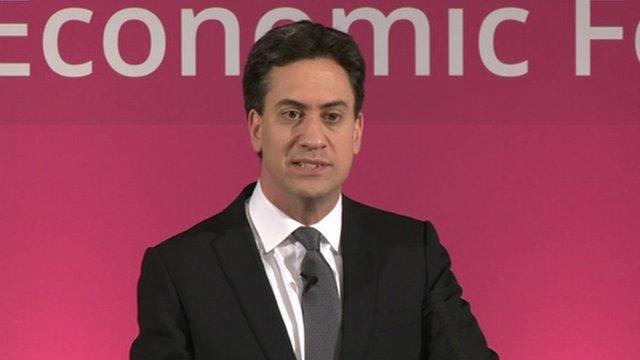
- Published11 December 2014
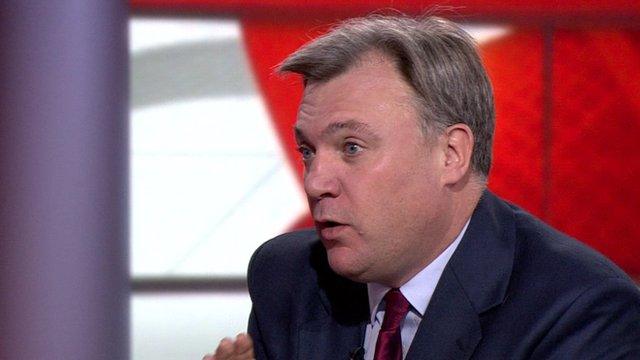
- Published3 December 2014
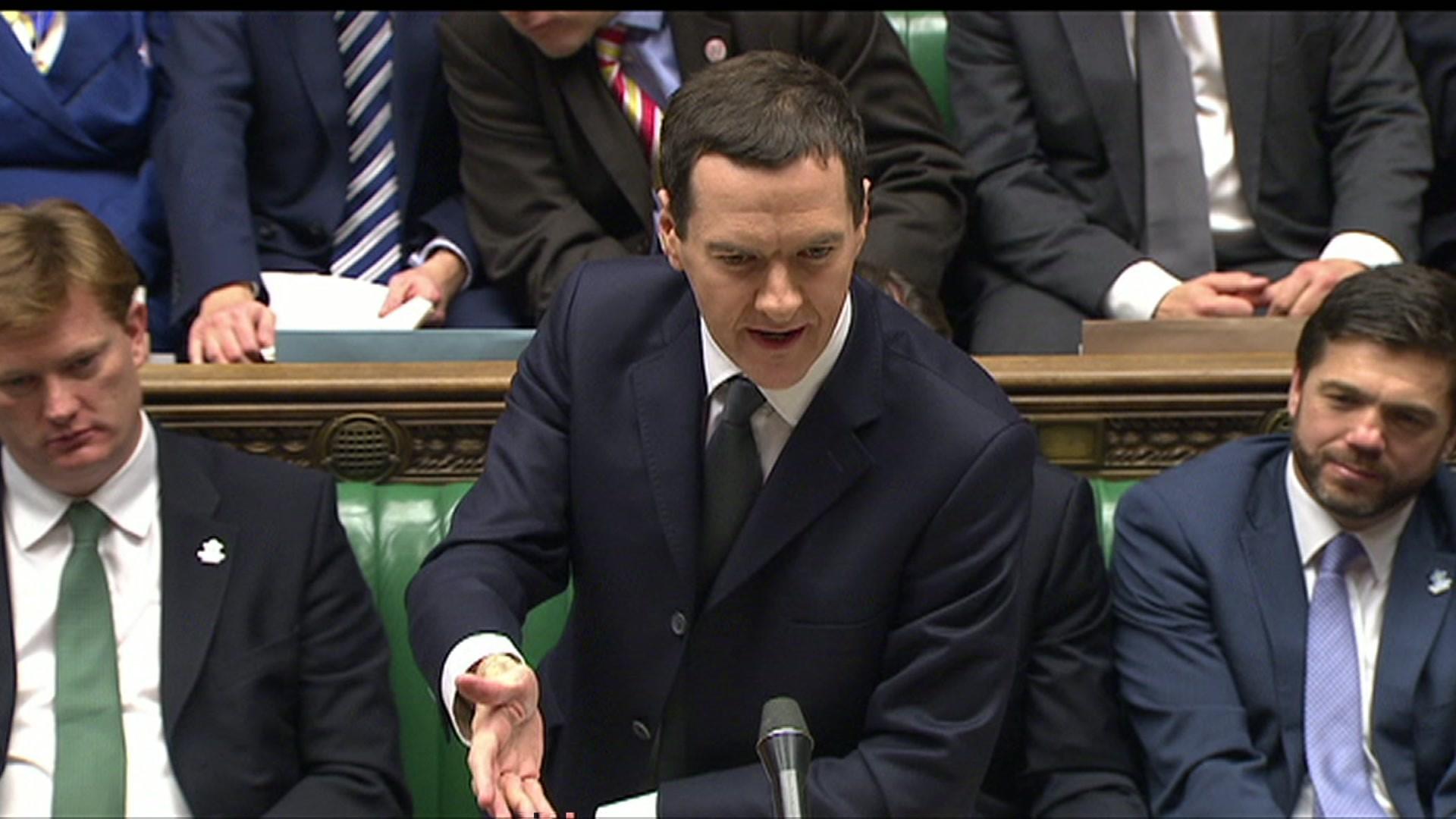
- Published3 December 2014
- Published3 December 2014

- Published3 December 2014
